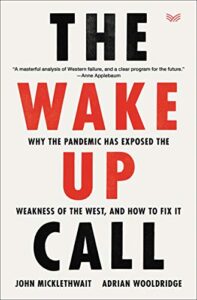 The covid-19 pandemic “is a wake-up call…not just as a public-health disaster, but a stress test of Western government,” John Micklethwait and Adrian Wooldridge contend in The Wake-Up Call: Why the pandemic has exposed the weakness of the West – and how to fix it. They go on to explain “why government matters, especially in promoting liberty and democracy, and to lay out a manifesto for reform,” notes former Harvard professor Joseph S. Nye Jr., and author most recently of “Do Morals Matter? Presidents and Foreign Policy from FDR to Trump.”
The covid-19 pandemic “is a wake-up call…not just as a public-health disaster, but a stress test of Western government,” John Micklethwait and Adrian Wooldridge contend in The Wake-Up Call: Why the pandemic has exposed the weakness of the West – and how to fix it. They go on to explain “why government matters, especially in promoting liberty and democracy, and to lay out a manifesto for reform,” notes former Harvard professor Joseph S. Nye Jr., and author most recently of “Do Morals Matter? Presidents and Foreign Policy from FDR to Trump.”
The authors’ fear is that the West will choose the wrong solutions, adding more government rather than better government, he writes for The Economist:
They warn against the temptation of thinking that authoritarian systems have been more successful than democratic ones, arguing that “people who embrace the autocracy argument are too inclined to focus just on the fact that America has handled the virus worse than China.” South Korea, Japan, Germany, and New Zealand did better than autocracies like China and Russia. It is… also noticeable that the type of democratic leadership mattered. Populist leaders… fared worse than prudent leaders, including Angela Merkel and Jacinda Ardern, who engendered public trust. RTWT
A new Amnesty International report calls on authorities to stop using COVID-19 as a pretext to sanction media outlets, opposition figures, or government critics (HT: NED’s International Forum).
 The narrative that democracies are inefficient, that they’re incapable of producing public goods like prosperity, stability and security is simply not true, says Associate Professor Tom Daly, Deputy Director of the Melbourne School of Government at the University of Melbourne and Associate Director of the Edinburgh Centre for Constitutional Law at the University of Edinburgh.
The narrative that democracies are inefficient, that they’re incapable of producing public goods like prosperity, stability and security is simply not true, says Associate Professor Tom Daly, Deputy Director of the Melbourne School of Government at the University of Melbourne and Associate Director of the Edinburgh Centre for Constitutional Law at the University of Edinburgh.
“It’s not borne out by the evidence. In fact, when you look at the COVID response, for example, some democracies have done well, others have not done well. Some authoritarian regimes have done well, others have not done well,” he tells the Lowy institute.
 “I think one of the most positive signs for me, in Australia, has been it’s shown that we can innovate,” Associate Professor Daly says. “The National Cabinet is an absolute case in point. No other federation came up with this idea of such an effective mechanism to cut across what is a very hyperpolarised political system to bring together executives of different party colours and achieve consensus and robust and swift decision-making.”
“I think one of the most positive signs for me, in Australia, has been it’s shown that we can innovate,” Associate Professor Daly says. “The National Cabinet is an absolute case in point. No other federation came up with this idea of such an effective mechanism to cut across what is a very hyperpolarised political system to bring together executives of different party colours and achieve consensus and robust and swift decision-making.”
“I think the lesson from the pandemic is, if we can do it with the National Cabinet, we can do it in other areas too. Really reinvigorating citizen participation in governance, not just at the federal level, but possibly at the state level, at the local level too.” RTWT
The state of democracy, before and during COVID-19 https://t.co/zVc5Vo3u6p
— Democracy Digest (@demdigest) September 2, 2020







